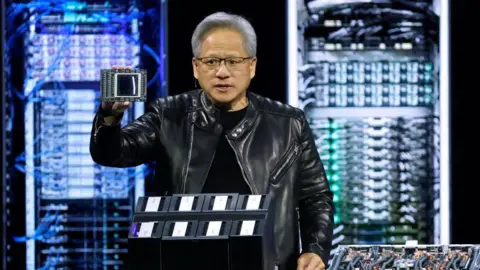Nvidia Faces $5.5 Billion Financial Impact Due to US Export Restrictions on Chip Sales to China

Nvidia, the prominent chip manufacturing giant that has been instrumental in fueling the artificial intelligence (AI) revolution, is bracing for a significant financial blow amounting to $5.5 billion. This hefty impact comes as a direct result of the recent tightening of export regulations by the United States government regarding the sale of its H20 AI chip to China. This development occurs amid a backdrop of escalating tensions and a trade conflict that has been brewing between the US and China, characterized by the imposition of steep tariffs on a wide range of goods.
On Tuesday, Nvidia announced that federal officials notified the company last week that it would now require a special license to export its H20 chip to China, which includes Hong Kong. This chip has been a cornerstone of Nvidias product lineup, particularly popular in AI applications across various industries.
The US government has indicated that the requirement for a license will remain in effect for the indefinite future. In a statement, Nvidia conveyed that the federal authorities expressed concerns regarding the potential risk that these advanced products could be utilized in or redirected to supercomputers within China. This aligns with the ongoing efforts by the US to curb the technological advancement of its rival.
When approached for further comments, Nvidia opted not to provide additional details to the BBC, reflecting the sensitive nature of the situation. Having been founded in 1993, Nvidia initially earned its reputation by developing graphics processing units (GPUs) particularly favored by the gaming community. However, as the demand for AI technology surged, Nvidia transitioned, enhancing its chips with capabilities designed to support machine learning processes.
The company has increasingly become a focal point for US export control measures, highlighting the geopolitical stakes associated with technological leadership. Earlier this year, Nvidia experienced a setback when news broke about a rival Chinese AI application called DeepSeek, which was developed at a significantly lower cost than existing chatbots. This revelation caught the US off guard and highlighted the competitive challenges facing American tech companies in the rapidly evolving AI landscape.
In light of the latest restrictions, Nvidia has stated that the anticipated $5.5 billion charges will primarily pertain to H20 products, covering costs associated with inventory, purchase commitments, and related reserves. This financial strain underscores the broader implications of trade policies and regulatory frameworks that increasingly intersect with technology and innovation.
















